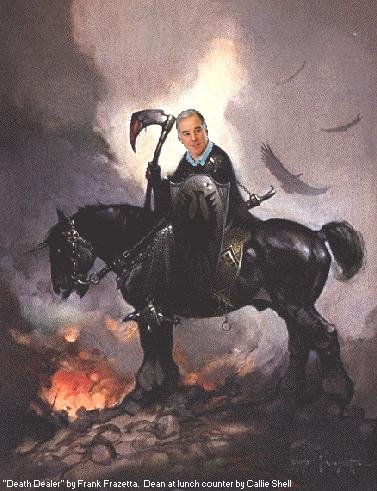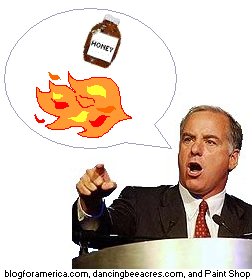

|
| clearcutting | constituents | crime | downtowns | environment | jobs |
presidential aspirations |
schools | miscellaneous |
 Biography:
Biography: In
1974 Dean's younger brother Charles, who had worked for the
McGovern campaign,
went to Laos for unexplained, rumored reasons (antiwar activism? undercover for
the CIA? no one will say). In any event, there he was slain, perhaps by the Pathet
Lao. To this day, Howard Dean wears his brother Charlie's belt in
memoriam, distinctive for its large metal eyelets. See Howard Dean's
own narrative for more on his brother Charles.
In
1974 Dean's younger brother Charles, who had worked for the
McGovern campaign,
went to Laos for unexplained, rumored reasons (antiwar activism? undercover for
the CIA? no one will say). In any event, there he was slain, perhaps by the Pathet
Lao. To this day, Howard Dean wears his brother Charlie's belt in
memoriam, distinctive for its large metal eyelets. See Howard Dean's
own narrative for more on his brother Charles. Budget
Budget"The 'young doctor-governor' began his effort by pushing Act 160 through to passage in his first legislative session (1992). This act created a Vermont Health Care Authority and charged it with bringing forth two sweeping health care plans. One was to be a single payer plan that Lt. Governor Dean had championed as in 1991. The other was something called "regulated multi-payer" that Gov. Dean championed in 1992. In addition, Act 160 imposed community rating on all health insurance premiums. ... As intended, community rating drove most of the private insurers out of the state."Other provisions of Act 160 authorized a statewide insurance pool (abandoned in six months), binding state control over hospital budgets, and a "safety net" for customers abandoned by the fleeing insurers (which cost Vermont Blue Cross millions of dollars until effectively repealed by regulatory fiat.)"In late 1993, the Authority presented the two required plans. They were immediately rejected both by Gov. Dean and by the single-payer forces in the Legislature. An effort to legislate a "universal access" plan collapsed so dramatically in the 1994 House that it became a national story in the New York Times. Shortly thereafter the Legislature abolished the Authority."In 1995, Dean decided to expand Medicaid instead of attempting a "universal" solution. Eligibility levels were increased until children in families with up to $51,000 income could qualify for benefits. To finance the expansion, the Legislature levied taxes on hospitals, nursing homes and tobacco, and even more drastically underpaid providers for the health care services demanded by program participants..."(After 11 years:) The state share of Medicaid spending has risen from $86.7 million to $263.5 million. ... According to Census Bureau figures, (the uninsured rate) has gone from 9.5 percent (1992) to 9.7 percent (averaged over 1999-2001). In 1994 - before Medicaid expansion - that data series ranked Vermont second among the states. The 2001 ranking for health insurance coverage placed Vermont 10th in the nation."... the Census Bureau data sample is quite small for Vermont, and thus the Vermont percentage jumps erratically between eight and 14 percent."(108)
"You know, I'm in the middle like Jim,' he says, referring to his 'good friend' and fellow politician Sen. James Jeffords, who caused an upheaval in state and national politics recently by leaving the Republican Party to become an independent. ... "Many of the principles I have about fiscal management are more akin to Republican than Democrat, no question about that."However, Dean says he could never switch parties."I would never be comfortable in the Republican Party. The far right is just too awful. If you look at the extreme of both parties, I think the extreme right has no compassion whatsoever and the extreme left, while I strongly disagree with their methods and their financial views, has a core of compassion," Dean says. "What they're trying to do is help people who need a hand. But the extreme right simply wants to dictate personal choices to everybody, and they couldn't really care less if people needed a hand or not... I think it's really important that the state (of Vermont) not move to the right..."One of the things I look for in a leader is a willingness to stand up to the extremes and say no. I worry deeply about the future of the state. One reason I was elected five times is because I can stand up to the liberal wing of the party," he says. "I worry about the ability of the next governor to stand up to extremism, regardless of what party that is."Dick Snelling (Vermont's previous governor) was willing to stand up to his party. If there was ever to be a Republican governor, it's not good enough just to be a moderate. They are going to have to be willing to stand up to the right wing of their party. ... If it's impolitic, that's just too bad. You have to be willing to tell off your people. ... No, I'm not going along with that... This is a new Republican Party," he says. "The old-line Vermont Republicans were pro-environment, pro-choice, anti-labor. The New Republicans have made a drastic shift to the right Ė they are anti-environment, anti-choice and not pro-business..."Dean compares the crop of social conservatives to civil rights opponents from 40 years ago."The extremists of the Republican Party are really descendents of the anti-civil rights movement Ö There are always people who don't want change, who fear change or are threatened by it. That is who the extremists in the Republican Party cater to."Dean was uneasy when he saw the Republican House in action."I'm concerned about the Republicans' spending in the budget," he says, referring to funding methods proposed by the GOP House that Dean says were unsustainable. (Unclear if this is USA House or Vermont House)"I knew there were issues we wouldn't agree on Ė abortion rights and civil unions Ė but I didn't think I'd have trouble on their spending," he says. "I am worried about the Republicans. It's one thing to fight with the Democrats who spend too much money. It's another thing to cook the books. I worry about what would happen if the Republicans took over financially..."I think there's a future for bipartisanship in the House (of Vermont)," he says. "As the speaker (Walter Freed, R-Dorset) becomes more statesmanlike and realizes what his obligations are, he will have to throw those people (social conservatives) over the side from time to time." (10)
"Let this Vermonter again address the Vermont school tax formerly known as Act 60 ... Act 68, which replaces Act 60, takes out the despised 'shark pool' that forced property wealthy towns like mine to send a ton of money to Montpelier for towns that didn't have a lot of valuable property.One problem with the 'shark pool' was that you could be 'property rich' and 'cash poor'. Older people especially who owned property other than two acres and a home, got clobbered. It put town against town and neighbor against neighbor. Dean supported us in setting up a 501.C.3 not-for profit foundation to support our school and avoid the shark pool. My property taxes on my home and two acres with the fund increased 25%. Had we not had the fund, they would have gone up almost 100%. Who do you blame, but Howard Dean because he signed the bill. With the repeal of the 'shark pool' and the raising of the per student grant, all Vermont towns are in better shape and the acrimony is fading.With the passage of time and careful reflection, I can't blame Dean for the bill. The Vermont Supreme Court mandated the funding change. The legislature was a lot more 'left wing' (two of the prime 'share the wealth' Democrats left the Senate) than it is now.
Howard Dean had to sign that bill and I now realize it. Calling him 'Marxist' is just plain stupid." (150)
"Nearly a fifth of the roughly $111,000 collected in its first months by Deanís presidential political action committee, the Fund for a Healthy America, came from people with ties to Vermontís electric utilities, according to a recent Federal Elections Commission filing. It should be no surprise. Dean and utility executives have had a long and friendly relationship."One donor who gave Deanís PAC the maximum amount allowed ó $5,000 ó ... is Robert Young of Proctor, who also is a top official at two utility companies that have had a lot of important business before state government during Deanís nearly 11 years in office. Young is chief executive at Central Vermont Public Service Corp. and chairman of Vermont Yankee Nuclear Power Corp."A top Dean aide emphatically denied that the governor has ever let campaign contributions influence state policy...But the governor himself has said the donations buy access. 'People who think theyíre going to buy a contract or buy some influence are mistaken,Ē Dean famously said during the debate over a campaign finance reform bill in 1996. 'But they do get access ó thereís no question about that. ...They get me to return their phone calls...'"Deanís close relationship with utility representatives dates back to the day he became governor in 1991. A lobbyist for Green Mountain Power and a GMP employee were among the first people Dean called in to help his transition."A list of the Governorís Council of Economic Advisers includes Green Mountain Power Corp.ís chairman, two company board members and a vice president, all of whom made donations to the Fund For A Healthy America. It also includes two longtime utility lobbyists."Over the years, the governor has sided with the utilities on many of the most pressing issues, including the push for deregulation of the electric industry, and later backing away from that as a goal.Among other major decisions:ó After years of pushing for the companies to absorb the excess costs of their expensive contract with Hydro-Quebec, Deanís Department of Public Service agreed to let ratepayers be billed for more than 90 percent of what those excess costs are expected to be in the coming years. The extra costs will be in the hundreds of millions of dollars.ó The department also agreed to allow the utilities to sell Vermont Yankee to a Pennsylvania company for a price that was expected to be $23.8 million by the time the deal closed. Shortly before the Public Service Board was to make a final decision on that sale, another company stepped in and offered more than seven times as much. That sale to Entergy Nuclear Corp. is currently before the board.ó After it became clear in the late 1990s that selling Vermont Yankee was a top goal of the utilities, the administration failed to heed warnings for more than two years that the money the nuclear plant was paying for emergency planning was much less than was needed. An administration official said there was concern about interfering with the sale."(98)
 Dean-isms
Dean-isms
 Back to General Dean Stuff
Back to General Dean Stuff |